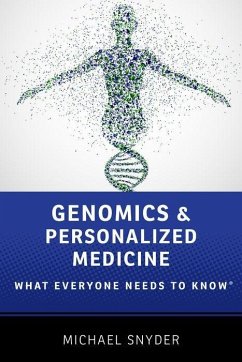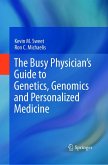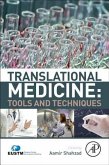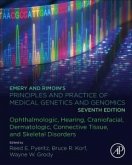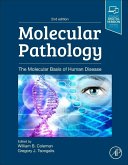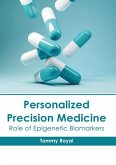- Gebundenes Buch
- Merkliste
- Auf die Merkliste
- Bewerten Bewerten
- Teilen
- Produkt teilen
- Produkterinnerung
- Produkterinnerung
Today genomics, part of a larger movement toward personalized medicine, is poised to revolutionize health care. By cross-referencing an individual's genetic sequence -- their genome -- against known elements of Big Data, elements of genomics are already being incorporated on a widespread basis, including prenatal disease screening and targeted cancer treatments. With more innovations soon to arrive at the bedside, the promise of the genomics revolution is limitless.
Andere Kunden interessierten sich auch für
![The Busy Physician's Guide To Genetics, Genomics and Personalized Medicine The Busy Physician's Guide To Genetics, Genomics and Personalized Medicine]() Kevin M. SweetThe Busy Physician's Guide To Genetics, Genomics and Personalized Medicine150,99 €
Kevin M. SweetThe Busy Physician's Guide To Genetics, Genomics and Personalized Medicine150,99 €![Translational Medicine: Tools and Techniques Translational Medicine: Tools and Techniques]() Translational Medicine: Tools and Techniques109,99 €
Translational Medicine: Tools and Techniques109,99 €![Essentials of Human Genomics Essentials of Human Genomics]() Essentials of Human Genomics165,99 €
Essentials of Human Genomics165,99 €![Emery and Rimoin's Principles and Practice of Medical Genetics and Genomics Emery and Rimoin's Principles and Practice of Medical Genetics and Genomics]() Emery and Rimoin's Principles and Practice of Medical Genetics and Genomics163,99 €
Emery and Rimoin's Principles and Practice of Medical Genetics and Genomics163,99 €![Molecular Pathology Molecular Pathology]() Molecular Pathology165,99 €
Molecular Pathology165,99 €![Personalized Precision Medicine: Role of Epigenetic Biomarkers Personalized Precision Medicine: Role of Epigenetic Biomarkers]() Personalized Precision Medicine: Role of Epigenetic Biomarkers161,99 €
Personalized Precision Medicine: Role of Epigenetic Biomarkers161,99 €![Hypoglycemia in Diabetes Hypoglycemia in Diabetes]() Philip E CryerHypoglycemia in Diabetes90,99 €
Philip E CryerHypoglycemia in Diabetes90,99 €-
-
-
Today genomics, part of a larger movement toward personalized medicine, is poised to revolutionize health care. By cross-referencing an individual's genetic sequence -- their genome -- against known elements of Big Data, elements of genomics are already being incorporated on a widespread basis, including prenatal disease screening and targeted cancer treatments. With more innovations soon to arrive at the bedside, the promise of the genomics revolution is limitless.
Hinweis: Dieser Artikel kann nur an eine deutsche Lieferadresse ausgeliefert werden.
Hinweis: Dieser Artikel kann nur an eine deutsche Lieferadresse ausgeliefert werden.
Produktdetails
- Produktdetails
- Verlag: Oxford University Press
- Seitenzahl: 182
- Erscheinungstermin: 8. März 2016
- Englisch
- Abmessung: 211mm x 142mm x 18mm
- Gewicht: 295g
- ISBN-13: 9780190234775
- ISBN-10: 0190234776
- Artikelnr.: 44492716
- Herstellerkennzeichnung
- Libri GmbH
- Europaallee 1
- 36244 Bad Hersfeld
- gpsr@libri.de
- Verlag: Oxford University Press
- Seitenzahl: 182
- Erscheinungstermin: 8. März 2016
- Englisch
- Abmessung: 211mm x 142mm x 18mm
- Gewicht: 295g
- ISBN-13: 9780190234775
- ISBN-10: 0190234776
- Artikelnr.: 44492716
- Herstellerkennzeichnung
- Libri GmbH
- Europaallee 1
- 36244 Bad Hersfeld
- gpsr@libri.de
Michael Snyder, PhD, is the Stanford Ascherman Professor, Chair of the Department of Genetics, and Director of the Center of Genomics and Personalized Medicine at Stanford University. His laboratory has produced many fundamental technologies for characterizing the human genome and other "-omes," including many pivotal discoveries about our DNA. In 2012 he used his own genome sequence to predict and help diagnose his own metabolic disorder, a story that received international news attention and shined a light on the promise of genomics. Snyder a co-founder of several successful biotechnology companies, including Personalis, Protometrix (now part of Life Technologies), Affomix (now part of Illumina), and Exelixis. He is regarded as a pioneer in bringing Big Data into medicine.
* Acknowledgements
* Introduction
* 1: Personalized Medicine
* What is personalized medicine?
* What personal factors impact your health?
* 2: Genome Fundamentals
* What is DNA?
* What is a genome?
* What does the genome do?
* How does one person's genome differ from another person's genome?
* How do genomes of men and women differ?
* How is the genome decoded?
* 3: An Introduction to Cancer Genetics
* What is cancer and how does it arise?
* How do the BRCA1 and BRCA2 genes cause cancer?
* What are examples of other genes implicated in cancer?
* How does genetic information help us treat cancer?
* 4: Genomics and Cancer Treatment
* What has been learned from genome sequencing of cancer?
* How can genome sequencing advance cancer treatment?
* If I have cancer should I get my tumor genome sequenced?
* Why do anticancer drugs fail and how might genomic approaches help
address this issue?
* Can genetics and genomics help detect early cancer and monitor
treatment effectiveness?
* A new approach: What is immunotherapy?
* How can genomics be used to harness the patient's own immune system
to fight their cancer?
* 5: Solving Mystery Diseases
* What is a mystery genetic disease?
* How many Mendelian diseases are there?
* How are genes responsible for genetic disorders identified?
* How useful are genomic approaches to solving mystery genetic
diseases?
* Why can't most Mendelian diseases be solved?
* 6: Complex genetic diseases
* What is a complex genetic disease?
* How do complex genetics affect neurological diseases?
* How does complex genetics affect metabolic diseases?
* Can some diseases be both monogenic and complex?
* 7: Pharmacogenomics
* How can your genome directly help guide drug treatments for treating
disease?
* What are other ways your DNA can guide drug treatments
* Are there sex differences in drug effects?
* 8: Genomics for the Healthy Person
* How can getting your genome sequence improve your health?
* Can genome sequencing affect the drugs someone take?
* Can genetic testing be used to predict sports performance and
injuries?
* Will sequencing my genome affect my children and my relatives?
* 9: Prenatal Testing
* How are genome sequencing technologies changing prenatal testing?
* Can genome sequencing be used to identify other mutations, beyond
chromosomal abnormalities, that might cause disease?
* Can genetic testing be useful for choosing healthier embryos and
producing designer babies?
* 10: Effects of the environment on the genome and epigenetics
* How does the environment contribute to health?
* When did people first begin to study environmental effects?
* When do environmental effects begin?
* Can environmental factors directly impact the genome?
* What is epigenetics?
* What are some examples of environmental effects on physiology that
are mediated through epigenetics?
* What is the role of epigenetics in disease?
* How will increased understanding of epigenetics impact health care?
* 11: Other 'Omes
* What other 'omes are useful for medicine?
* How can the transcriptome and proteome be useful?
* How can the metabolome be useful?
* How deeply can a person be analyzed?
* 12: The personal microbiome
* What is the microbiome?
* How is the microbiome studied?
* How does the microbiome affect health?
* How does diet affect the microbiome?
* Can the microbiome affect other aspects of our lives?
* Can the microbiome be altered to improve human health?
* 13: Your Immune System and Infectious Diseases
* How does your immune system protect you?
* How does the immune system vary among people and affect our health?
* How can we analyze infectious diseases?
* 14: How does age affect your health?
* Are there genetic factors underlying longevity?
* Are there environmental factors that affect aging and longevity?
* Does epigenetics control aging?
* Will we someday be able to control our aging?
* 15: Wearable Health Devices
* What other types of personal health information can be readily
collected?
* How will this information be made available to, and used by, the
individual?
* 16: Big Data and medicine
* How much data can be gathered about a single person?
* How much data can be gathered about a group of people?
* How can a large database assist in medical care?
* How can Big Data guide lifestyle decisions?
* What are the opportunities for industry in Big Data Medicine?
* 17: Delivery of genomic information
* Who controls your genomic and other health information?
* Who will deliver genomic information to you?
* What is the role of the physician?
* What are the implications of direct-to-consumer genomic testing?
* 18: Ethics
* Can your genetic information be used against you?
* What are the concerns surrounding routine (or even mandated) genetic
screening?
* What is a possible solution?
* 19: Education
* Can we educate people to understand genomic information?
* How do we educate physicians to understand genomic information
* Who else should we educate? What is the role of health care
providers, insurers and policy makers?
* 20: Privacy: Identifying people from their sequences.
* Can people be identified solely from the genome sequence?
* Will getting my genome sequenced affect my family members?
* 21: Paying for personalized medicine
* Who pays for genome sequencing in treating disease?
* Who pays for genome sequencing in preventive medicine?
* Will genome sequencing make health care cheaper?
* Will people act on genomic information?
* 22: The future of personalized medicine
* What other technologies will be prevalent in the personalized
medicine space?
* What will the future look like?
* Index
* Introduction
* 1: Personalized Medicine
* What is personalized medicine?
* What personal factors impact your health?
* 2: Genome Fundamentals
* What is DNA?
* What is a genome?
* What does the genome do?
* How does one person's genome differ from another person's genome?
* How do genomes of men and women differ?
* How is the genome decoded?
* 3: An Introduction to Cancer Genetics
* What is cancer and how does it arise?
* How do the BRCA1 and BRCA2 genes cause cancer?
* What are examples of other genes implicated in cancer?
* How does genetic information help us treat cancer?
* 4: Genomics and Cancer Treatment
* What has been learned from genome sequencing of cancer?
* How can genome sequencing advance cancer treatment?
* If I have cancer should I get my tumor genome sequenced?
* Why do anticancer drugs fail and how might genomic approaches help
address this issue?
* Can genetics and genomics help detect early cancer and monitor
treatment effectiveness?
* A new approach: What is immunotherapy?
* How can genomics be used to harness the patient's own immune system
to fight their cancer?
* 5: Solving Mystery Diseases
* What is a mystery genetic disease?
* How many Mendelian diseases are there?
* How are genes responsible for genetic disorders identified?
* How useful are genomic approaches to solving mystery genetic
diseases?
* Why can't most Mendelian diseases be solved?
* 6: Complex genetic diseases
* What is a complex genetic disease?
* How do complex genetics affect neurological diseases?
* How does complex genetics affect metabolic diseases?
* Can some diseases be both monogenic and complex?
* 7: Pharmacogenomics
* How can your genome directly help guide drug treatments for treating
disease?
* What are other ways your DNA can guide drug treatments
* Are there sex differences in drug effects?
* 8: Genomics for the Healthy Person
* How can getting your genome sequence improve your health?
* Can genome sequencing affect the drugs someone take?
* Can genetic testing be used to predict sports performance and
injuries?
* Will sequencing my genome affect my children and my relatives?
* 9: Prenatal Testing
* How are genome sequencing technologies changing prenatal testing?
* Can genome sequencing be used to identify other mutations, beyond
chromosomal abnormalities, that might cause disease?
* Can genetic testing be useful for choosing healthier embryos and
producing designer babies?
* 10: Effects of the environment on the genome and epigenetics
* How does the environment contribute to health?
* When did people first begin to study environmental effects?
* When do environmental effects begin?
* Can environmental factors directly impact the genome?
* What is epigenetics?
* What are some examples of environmental effects on physiology that
are mediated through epigenetics?
* What is the role of epigenetics in disease?
* How will increased understanding of epigenetics impact health care?
* 11: Other 'Omes
* What other 'omes are useful for medicine?
* How can the transcriptome and proteome be useful?
* How can the metabolome be useful?
* How deeply can a person be analyzed?
* 12: The personal microbiome
* What is the microbiome?
* How is the microbiome studied?
* How does the microbiome affect health?
* How does diet affect the microbiome?
* Can the microbiome affect other aspects of our lives?
* Can the microbiome be altered to improve human health?
* 13: Your Immune System and Infectious Diseases
* How does your immune system protect you?
* How does the immune system vary among people and affect our health?
* How can we analyze infectious diseases?
* 14: How does age affect your health?
* Are there genetic factors underlying longevity?
* Are there environmental factors that affect aging and longevity?
* Does epigenetics control aging?
* Will we someday be able to control our aging?
* 15: Wearable Health Devices
* What other types of personal health information can be readily
collected?
* How will this information be made available to, and used by, the
individual?
* 16: Big Data and medicine
* How much data can be gathered about a single person?
* How much data can be gathered about a group of people?
* How can a large database assist in medical care?
* How can Big Data guide lifestyle decisions?
* What are the opportunities for industry in Big Data Medicine?
* 17: Delivery of genomic information
* Who controls your genomic and other health information?
* Who will deliver genomic information to you?
* What is the role of the physician?
* What are the implications of direct-to-consumer genomic testing?
* 18: Ethics
* Can your genetic information be used against you?
* What are the concerns surrounding routine (or even mandated) genetic
screening?
* What is a possible solution?
* 19: Education
* Can we educate people to understand genomic information?
* How do we educate physicians to understand genomic information
* Who else should we educate? What is the role of health care
providers, insurers and policy makers?
* 20: Privacy: Identifying people from their sequences.
* Can people be identified solely from the genome sequence?
* Will getting my genome sequenced affect my family members?
* 21: Paying for personalized medicine
* Who pays for genome sequencing in treating disease?
* Who pays for genome sequencing in preventive medicine?
* Will genome sequencing make health care cheaper?
* Will people act on genomic information?
* 22: The future of personalized medicine
* What other technologies will be prevalent in the personalized
medicine space?
* What will the future look like?
* Index
* Acknowledgements
* Introduction
* 1: Personalized Medicine
* What is personalized medicine?
* What personal factors impact your health?
* 2: Genome Fundamentals
* What is DNA?
* What is a genome?
* What does the genome do?
* How does one person's genome differ from another person's genome?
* How do genomes of men and women differ?
* How is the genome decoded?
* 3: An Introduction to Cancer Genetics
* What is cancer and how does it arise?
* How do the BRCA1 and BRCA2 genes cause cancer?
* What are examples of other genes implicated in cancer?
* How does genetic information help us treat cancer?
* 4: Genomics and Cancer Treatment
* What has been learned from genome sequencing of cancer?
* How can genome sequencing advance cancer treatment?
* If I have cancer should I get my tumor genome sequenced?
* Why do anticancer drugs fail and how might genomic approaches help
address this issue?
* Can genetics and genomics help detect early cancer and monitor
treatment effectiveness?
* A new approach: What is immunotherapy?
* How can genomics be used to harness the patient's own immune system
to fight their cancer?
* 5: Solving Mystery Diseases
* What is a mystery genetic disease?
* How many Mendelian diseases are there?
* How are genes responsible for genetic disorders identified?
* How useful are genomic approaches to solving mystery genetic
diseases?
* Why can't most Mendelian diseases be solved?
* 6: Complex genetic diseases
* What is a complex genetic disease?
* How do complex genetics affect neurological diseases?
* How does complex genetics affect metabolic diseases?
* Can some diseases be both monogenic and complex?
* 7: Pharmacogenomics
* How can your genome directly help guide drug treatments for treating
disease?
* What are other ways your DNA can guide drug treatments
* Are there sex differences in drug effects?
* 8: Genomics for the Healthy Person
* How can getting your genome sequence improve your health?
* Can genome sequencing affect the drugs someone take?
* Can genetic testing be used to predict sports performance and
injuries?
* Will sequencing my genome affect my children and my relatives?
* 9: Prenatal Testing
* How are genome sequencing technologies changing prenatal testing?
* Can genome sequencing be used to identify other mutations, beyond
chromosomal abnormalities, that might cause disease?
* Can genetic testing be useful for choosing healthier embryos and
producing designer babies?
* 10: Effects of the environment on the genome and epigenetics
* How does the environment contribute to health?
* When did people first begin to study environmental effects?
* When do environmental effects begin?
* Can environmental factors directly impact the genome?
* What is epigenetics?
* What are some examples of environmental effects on physiology that
are mediated through epigenetics?
* What is the role of epigenetics in disease?
* How will increased understanding of epigenetics impact health care?
* 11: Other 'Omes
* What other 'omes are useful for medicine?
* How can the transcriptome and proteome be useful?
* How can the metabolome be useful?
* How deeply can a person be analyzed?
* 12: The personal microbiome
* What is the microbiome?
* How is the microbiome studied?
* How does the microbiome affect health?
* How does diet affect the microbiome?
* Can the microbiome affect other aspects of our lives?
* Can the microbiome be altered to improve human health?
* 13: Your Immune System and Infectious Diseases
* How does your immune system protect you?
* How does the immune system vary among people and affect our health?
* How can we analyze infectious diseases?
* 14: How does age affect your health?
* Are there genetic factors underlying longevity?
* Are there environmental factors that affect aging and longevity?
* Does epigenetics control aging?
* Will we someday be able to control our aging?
* 15: Wearable Health Devices
* What other types of personal health information can be readily
collected?
* How will this information be made available to, and used by, the
individual?
* 16: Big Data and medicine
* How much data can be gathered about a single person?
* How much data can be gathered about a group of people?
* How can a large database assist in medical care?
* How can Big Data guide lifestyle decisions?
* What are the opportunities for industry in Big Data Medicine?
* 17: Delivery of genomic information
* Who controls your genomic and other health information?
* Who will deliver genomic information to you?
* What is the role of the physician?
* What are the implications of direct-to-consumer genomic testing?
* 18: Ethics
* Can your genetic information be used against you?
* What are the concerns surrounding routine (or even mandated) genetic
screening?
* What is a possible solution?
* 19: Education
* Can we educate people to understand genomic information?
* How do we educate physicians to understand genomic information
* Who else should we educate? What is the role of health care
providers, insurers and policy makers?
* 20: Privacy: Identifying people from their sequences.
* Can people be identified solely from the genome sequence?
* Will getting my genome sequenced affect my family members?
* 21: Paying for personalized medicine
* Who pays for genome sequencing in treating disease?
* Who pays for genome sequencing in preventive medicine?
* Will genome sequencing make health care cheaper?
* Will people act on genomic information?
* 22: The future of personalized medicine
* What other technologies will be prevalent in the personalized
medicine space?
* What will the future look like?
* Index
* Introduction
* 1: Personalized Medicine
* What is personalized medicine?
* What personal factors impact your health?
* 2: Genome Fundamentals
* What is DNA?
* What is a genome?
* What does the genome do?
* How does one person's genome differ from another person's genome?
* How do genomes of men and women differ?
* How is the genome decoded?
* 3: An Introduction to Cancer Genetics
* What is cancer and how does it arise?
* How do the BRCA1 and BRCA2 genes cause cancer?
* What are examples of other genes implicated in cancer?
* How does genetic information help us treat cancer?
* 4: Genomics and Cancer Treatment
* What has been learned from genome sequencing of cancer?
* How can genome sequencing advance cancer treatment?
* If I have cancer should I get my tumor genome sequenced?
* Why do anticancer drugs fail and how might genomic approaches help
address this issue?
* Can genetics and genomics help detect early cancer and monitor
treatment effectiveness?
* A new approach: What is immunotherapy?
* How can genomics be used to harness the patient's own immune system
to fight their cancer?
* 5: Solving Mystery Diseases
* What is a mystery genetic disease?
* How many Mendelian diseases are there?
* How are genes responsible for genetic disorders identified?
* How useful are genomic approaches to solving mystery genetic
diseases?
* Why can't most Mendelian diseases be solved?
* 6: Complex genetic diseases
* What is a complex genetic disease?
* How do complex genetics affect neurological diseases?
* How does complex genetics affect metabolic diseases?
* Can some diseases be both monogenic and complex?
* 7: Pharmacogenomics
* How can your genome directly help guide drug treatments for treating
disease?
* What are other ways your DNA can guide drug treatments
* Are there sex differences in drug effects?
* 8: Genomics for the Healthy Person
* How can getting your genome sequence improve your health?
* Can genome sequencing affect the drugs someone take?
* Can genetic testing be used to predict sports performance and
injuries?
* Will sequencing my genome affect my children and my relatives?
* 9: Prenatal Testing
* How are genome sequencing technologies changing prenatal testing?
* Can genome sequencing be used to identify other mutations, beyond
chromosomal abnormalities, that might cause disease?
* Can genetic testing be useful for choosing healthier embryos and
producing designer babies?
* 10: Effects of the environment on the genome and epigenetics
* How does the environment contribute to health?
* When did people first begin to study environmental effects?
* When do environmental effects begin?
* Can environmental factors directly impact the genome?
* What is epigenetics?
* What are some examples of environmental effects on physiology that
are mediated through epigenetics?
* What is the role of epigenetics in disease?
* How will increased understanding of epigenetics impact health care?
* 11: Other 'Omes
* What other 'omes are useful for medicine?
* How can the transcriptome and proteome be useful?
* How can the metabolome be useful?
* How deeply can a person be analyzed?
* 12: The personal microbiome
* What is the microbiome?
* How is the microbiome studied?
* How does the microbiome affect health?
* How does diet affect the microbiome?
* Can the microbiome affect other aspects of our lives?
* Can the microbiome be altered to improve human health?
* 13: Your Immune System and Infectious Diseases
* How does your immune system protect you?
* How does the immune system vary among people and affect our health?
* How can we analyze infectious diseases?
* 14: How does age affect your health?
* Are there genetic factors underlying longevity?
* Are there environmental factors that affect aging and longevity?
* Does epigenetics control aging?
* Will we someday be able to control our aging?
* 15: Wearable Health Devices
* What other types of personal health information can be readily
collected?
* How will this information be made available to, and used by, the
individual?
* 16: Big Data and medicine
* How much data can be gathered about a single person?
* How much data can be gathered about a group of people?
* How can a large database assist in medical care?
* How can Big Data guide lifestyle decisions?
* What are the opportunities for industry in Big Data Medicine?
* 17: Delivery of genomic information
* Who controls your genomic and other health information?
* Who will deliver genomic information to you?
* What is the role of the physician?
* What are the implications of direct-to-consumer genomic testing?
* 18: Ethics
* Can your genetic information be used against you?
* What are the concerns surrounding routine (or even mandated) genetic
screening?
* What is a possible solution?
* 19: Education
* Can we educate people to understand genomic information?
* How do we educate physicians to understand genomic information
* Who else should we educate? What is the role of health care
providers, insurers and policy makers?
* 20: Privacy: Identifying people from their sequences.
* Can people be identified solely from the genome sequence?
* Will getting my genome sequenced affect my family members?
* 21: Paying for personalized medicine
* Who pays for genome sequencing in treating disease?
* Who pays for genome sequencing in preventive medicine?
* Will genome sequencing make health care cheaper?
* Will people act on genomic information?
* 22: The future of personalized medicine
* What other technologies will be prevalent in the personalized
medicine space?
* What will the future look like?
* Index

